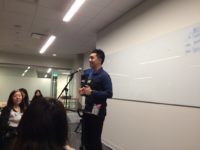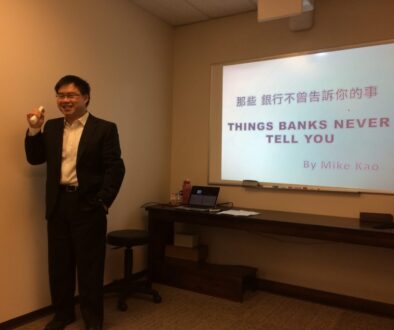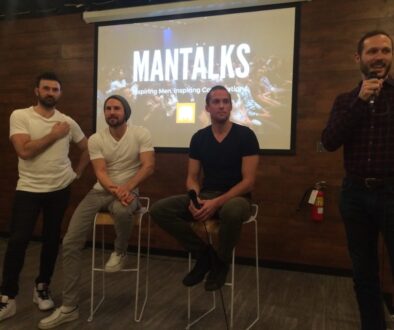LEADUP – PowerUP: How to kick fear in the face and live the life of your dreams
Date: November 13, 2015
Name: LEADUP – PowerUP: How to kick fear in the face and live the life of your dreams
Presenters: Byron Cheung and Emily Lim
Many leaders are lacking the right soft skills to break their limitation; moreover, hard skills will cover the technical aspects, but soft skills will approach the vision. LEADUP is a community founded by Emily Lim, the Pastor of New Joy Church, to help young leaders to train, teach, grow and inspire their leadership skills. The community is to allow young leaders to break through their limitation and discover their potentials. LEADUP invites Byron Cheung, the winner of the Golden Voice Award, to share his leadership lessons from his singing journey. The presentation will follow by Emily Lim’s energy presentation to discuss the importance of energy management.
Byron Cheung
Byron Cheung asked a simple question that most people are afraid to face. The question is “Am I happy with my job?” and most people’s answer is no, but they are afraid to deal with it. Based on statistic, most employees are not satisfied with their salary and the percentage of them who love their current job and the percentage of them who think their career is meaningful is significantly low. However, Facebook has managed to increase the employee satisfaction of over 90%. Byron believes the difference is that they discover their purpose and have the right mindset to achieve their purpose.
GO FAR
Cheung learned many new valuable lessons from different jobs he had. He believes every job is a stepping stone to another job. However, his journey is not as easy as what people think.
In 2012, He received second place in the New Talent Singing Awards Competition. Even though he won the best vocal award, but Cheung still feel defeated. He was disappointed when he discovered one of the judge is the champion’s teacher. In addition, he started to give up.
In 2013, he was invited to another Hong Kong Sining competition and he could not past the second round. The result was a big hit for Cheung. In 2014, he graduated from the Art Institution and his academic path helped his music passion reunite. He learned he had the mindset of competing others, which limited his ability. He decided to change.
In 2015, he started his own recording studio and an expected opportunity came by for Cheung. He was invited to compete the Golden Voice Award in Hong Kong. He was hesitated to join because of his previous failure, but with the support from his friends and family, he overcame the obstacles. With his new mindset, he won the competition and received the singing contract.
“No success is self made”
Leaders are living in the culture that working alone is necessary to be successful. However, Cheung disagrees. He believes working as a team is important. He develops the GO FAR system to help leaders to overcome fear.
GO stands for “Goal Oriented”. Cheung believes it is good to be competitive, but leaders should compete themselves, not others. F stands for “Focus”. Leaders need to stay on track with the goals. Leaders must continuously practice to ensure they are laser focused on their goals. A stands for “Attitude”. Leaders should not let any circumstances to control their direction. If the odds are not in favour of leaders, it is their obligation to change the odds. R stands for “Reason”. Facebook is successful because they know their “why”. Leaders must discover their “why”. Cheung wants to influence the society. He discovers Hong Kong music industry is dying and he believes he can change it. Therefore, it is important to know why leaders are achieving their goals.
“Do not live by fear”
Emily Lim
Emily Lim is the Pastor of the New Joy Church. She founded the LEADUP community to help young leaders to laser focus their goals and passion. The community will help young leaders to focus and unleash their purpose within. It will also empower the better vision of them and it creates the driving force to their fullest potential. Lim is also a motivational speaker who has the passion of developing soft skills for young leaders. Moreover, her voice and messages have encourage many young leaders to reach their maximum potential.
Lim believes the major resource is not time, and it is energy. Lim provides the saw mill example. A worker works hard in his saw mill job. The harder he works, the lower his productivity. At the end, he realizes the reason he could not improve his productivity is because he did not sharpen the saw.
Leaders need to focus on emotional energy. When leaders manage their emotion, they can leverage their success. Emotions can either be good or bad because it depends on how leader harness the emotion. More importantly, Lim wants leaders to focus their goal with the right emotions.
Lim believes leaders must use their emotions to blow past the inertia of procrastination. Success comes from long term perspective. With the right decision making, leaders can launch their vision. Lim shares 3 surprising energy drawing saying for leaders to discover their limitation.
Saying #1: I am a hard worker
Leaders will say that they are hard worker. However, this is misconception because the universe do not reward hard work, it rewards recognized results. Leaders should not focus on hard work. Lim shares the Sisyphus story. Sisyphus has one job, and the job is to work the stone up to the mountain. He is considered to be a hard worker, but he is not rewarded with the work. If he changes his thinking and breaks the stone, he will be able to use the small pieces of the stone to build houses. He will then feel empowered because he is building a community.
“Hard work is not your goal, it is simply a likely by-product of a worthy mission accomplished”
Saying #2: I do not have time
When leaders say they do not have time, the truth is that they do not want to face the reality. Everyone has 24 hours and many leaders waste their time to procrastinate. Lim indicates when leaders say they do not have time, it means the time is managing them. Instead of that statement, Lim suggests leaders to say “I choose not to make that a priority”. This will allow leaders to manage their time. If leaders cannot control their time management, they do not have guilt. When leaders make priority, they will know what is important.
Saying #3: Someone made me
Sometimes leaders believe happiness comes from other people’s actions. However, Lim believes it is their responsibility to be in charge of their happiness. It is important for leaders to know that it is not right to allow other people’s to control leaders’ own happiness. Therefore, leaders should say “this person did this and I choose to be mad”. This statement will allow leaders to take back the power so they can move on. This statement will also change leaders’ emotions.
“We do not want to be thermometer, we want to be thermostats”
Leaders might have unlimited resources, but they have limited energy. Lim suggests leaders to put their energy in the right place.
Lim provides 3 interesting tips to take control energy and emotions.
The first tip is to get rid of the old letters. When leaders receive the letters, it serves the purpose to provide the emotion. When the purpose is met, leaders should thank the letter and throw away. The second tip is to have a capsule closet. Leaders can limit their clothes so they do not need to use the energy to choose their clothes in the morning. Based on statistic, when people make too many choices, their judgement will reduce. The third tip is to know their emotion energy tank. Leaders need to know when their emotion energy tank fill up. This will give themselves the permission to be themselves and control their emotions.
Wheels of life
Lim provides the wheel of life chart. The chart contains attitude, career, finance, personal growth, health, family, relationship, and social life. When leaders rate their wheel of life, they will discover the strong and weak elements.
In order to improve the wheel of life, Lim shares the formula.
E + R = O
E is events, R is responses, and O is the outcome. Leaders cannot control the events, but they can control their responses. When leaders should always put their energy they value the most. Their actions must be congruent to their vision. They need to develop their own personal mission statement and always self assess all the time.






